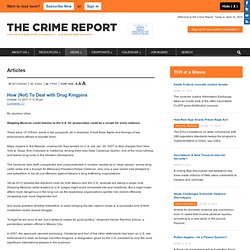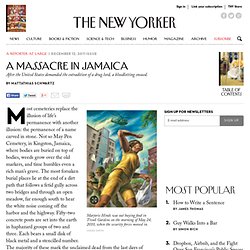

Meth Hype Could Undermine Good Medicine. The 1936 film Reefer Madness developed a cult following because of its over-the-top depiction of the evils of marijuana.

Getting stoned and going to a midnight showing became a ritual for many college students. The recognition that pot is not a direct route to an asylum for the criminally insane, as it was for one character in the film, fueled the hilarity for late-night moviegoers. The divergence between perception and reality has become an issue in recent years for other recreational drugs. Last month four scientists from Columbia University published an analysis of previous studies on methamphetamine use that called into question some of the purported damaging effects of the drug on brain functioning.
The review in Neuropsychopharmacology found that short-term effects of the drug actually improve attention, as well as visual and spatial perception, among other things. Bath Salts: Deep in the Heart of America's New Drug Nightmare. COLUMBUS, OH — On an unseasonably hot and muggy May afternoon, a squad of armed agents from the Franklin County Drug Task Force — some wearing street clothes, some wearing menacing ski masks — swarms into a storefront aptly named the Joint.

Sandwiched between a liquor store and a sex shop, and adjacent to the Ohio State University campus, the Joint is one of 18 different head shops, gas stations, carryout restaurants, and mini-marts being searched this day by seven task force teams consisting of several dozen officers from numerous local police departments and prosecutors' offices, all spearheaded by the County Sheriff here in the state capital. Make no mistake: This is no ordinary pot bust. Criminalising drugs is harming medical research - opinion - 12 June 2012. Experts Tell the Truth about Pot. The New Dealers. Photo Illustration: William Duke For some time, I'd been hearing stories from my sources in the interstate marijuana racket about law-abiding "civilians" turning to the game because of the recession, and so, armed with introductions, I hit the road to meet some of these unlikely criminals face to face.

That's how, on a hot evening in June, I found myself in Dan's Northern California kitchen. Dan isn't his real name. Nor are any of the names in this story, for obvious reasons. But his situation is a familiar, harsh reality for many Americans, as I learned while doing research for my recent novel on this subject. Today, Dan's toys are gone, sold to support an underwater mortgage. "There were no jobs. Keeping the house has been Dan's only real goal since 2008, when he was laid off. How (Not) To Deal with Drug Kingpins. Shipping Mexican cartel bosses to the U.S. for prosecution could be a recipe for more violence.

There were 15 of them, some in tan jumpsuits, all in shackles. It took three flights and throngs of law enforcement officers to transfer them. Major players in the Mexican underworld, they landed on U.S. soil Jan. 20, 2007 to face charges from New York to Texas, from Colorado to California. Extraditing Christopher Coke and a Massacre in Jamaica. Most cemeteries replace the illusion of life’s permanence with another illusion: the permanence of a name carved in stone.

Not so May Pen Cemetery, in Kingston, Jamaica, where bodies are buried on top of bodies, weeds grow over the old markers, and time humbles even a rich man’s grave. The most forsaken burial places lie at the end of a dirt path that follows a fetid gully across two bridges and through an open meadow, far enough south to hear the white noise coming off the harbor and the highway. Fifty-two concrete posts are set into the earth in haphazard groups of two and three. War on drugs a failure says international group. Almost 100 years after the League of Nations’ first law on narcotics (drugs), the International Opium Convention of 1912, a report released yesterday, June 2, 2011, says the global war on drugs is a failure and governments need to initiate other policies, including legalizing marijuana and other currently controlled substances.

The report, War on drugs by the Global Commission on Drug Policy (GCDP), a think tank that includes former UN secretary-general Kofi Annan, the current prime minister of Greece, the past presidents of Mexico, Brazil and Colombia, along with distinguished world leaders and statesmen, said “the global war on drugs has failed, with devastating consequences for individuals and societies around the world”. The international war on drugs has failed – “End the criminalization, marginalization and stigmatization of people who use drugs but who do no harm to others” No war on drugs means no WHO & US government aid money. Matt Stoller: Who Wants Keep the War on Drugs Going AND Put You in Debtor’s Prison? Matt Stoller is a current fellow at the Roosevelt Institute.

His Twitter feed is @matthewstoller. More than a third of all states allow debtors “who can’t or won’t pay their debts” to be jailed. In 2010, according to the Wall Street Journal, judges have issued 5,000 such warrants. What is behind the increased pressure to incarcerate people with debts? Is it a desire to force debt payment? The Ethics of the US Role in the Drug War. In recent weeks, the United States has come under increasing pressure from Latin American leaders to rethink its drug control policy—and specifically, to at least start talking about decriminalization.

As analysts such as Ethan Nadelmann of the Drug Policy Alliance have pointed out this week, this is a big shift: At first it was just academics and activists advocating for legalization; then it was former heads of state. Now, the sitting presidents of countries including Colombia and Guatemala are demanding that Washington change course. Earlier this month when Vice President Joe Biden visited the region, he got an earful from the leaders of Mexico, Guatemala, Honduras, El Salvador, and Costa Rica to that effect. End the Drug War - By Fulton T. Armstrong. What more evidence does the U.S. government need to understand that the current approach to fighting the Mexican drug cartels is failing?

The U.S. general who commands military forces in North America testified before a Senate committee last week that, while the "decapitation strategy" has succeeded in killing some of Mexico's major drug figures, it "has not had an appreciable effect" in thwarting the drug trade. Regional leaders see it even more dimly, as evidenced by their frustrated reactions to Vice President Joseph Biden's visit to Mexico and Central America this month. That trip suggested the White House just doesn't grasp that the approach launched by George W. Bush's administration in 2007, and continued essentially unchanged by President Barack Obama, has been irrelevant at best and disastrous at worst. Mexico is far from being a "failed state," but its skyrocketing violence threatens our interests as well as its own.
Both sides deserve blame in choosing this approach. The Narco State - By Charles Kenny. America's longest running war -- the one against drugs -- came in for abuse this weekend at the Summit of the Americas.

The abuse is deserved. Forty years of increasingly violent efforts to stamp out the drug trade haven't worked. And the blood and treasure lost is on a scale with America's more conventional wars. Argentina: The New Narco State - By Haley Cohen. BUENOS AIRES — Last September, Argentine Judge Carlos Olivera Pastor emerged from his courthouse in the northwestern province of Jujuy to find a box next to his parked car. 150 Miles of Hell Photograph by Peter van Agtmael. Mexico's Sinaloa drug cartel: DEA unravels a cocaine cartel web. Reporting from Calexico, Calif.— Never lose track of the load. It was drilled into everybody who worked for Carlos “Charlie” Cuevas. Jeremy Harding · The Deaths Map: At the Mexican Border · LRB 20 October 2011. Migration is said to be good for host cultures.
Geographers, demographers and business people believe it is, especially in the US, where one migrant group after another – Jews, Poles, Italians, Irish – has auditioned for a role in the great musical of American identity. The competition has been bitter, especially between newcomers and predecessors, and the typecasting has been crude, yet sooner or later every minority earns its place in the chorus. Nonetheless there’s a growing sense in some parts of the US that enough is enough, the stage is full to capacity and the show can no longer go on as it has. The source of this impatience is illegal immigration from Mexico, which is no longer seen primarily as a supply of service employees, farm labour and building workers, but as a threat to an indebted nation still embroiled in distant wars, with land borders to north and south that it can’t patrol as effectively as it would like and unemployment hovering at around 9 per cent.
Cracking the Mexican Cartels. Should Central America Legalize Drugs? - Ralph Espach - International. An End to the War on Drugs? by Alma Guillermoprieto. Should Central America's drug violence be considered a global crisis? A new report from the U.N.'s International Narcotics Control Board contains more grim news about the drug violence in Central America: In Central America, the escalating drug-related violence involving drug trafficking, transnational and local gangs and other criminal groups has reached alarming and unprecedented levels, significantly worsening security and making the subregion one of the most violent areas in the world.
Crime and drug-related violence continue to be key issues of concern in Central American countries. Drug trafficking (including fighting between and within drug trafficking and criminal organizations operating out of Colombia and Mexico), youth-related violence and street gangs, along with the widespread availability of firearms, have contributed to increasingly high crime rates in the subregion. There are more than 900 maras (local gangs) active in Central America today, with over 70,000 members. America's drug war partners are speaking their minds. By Adam Siegel Colombian president Juan Manuel Santos is likely to open the Sixth Summit of the Americas in Cartagena next month with a standard welcome for Barack Obama and the 33 other leaders of the Western Hemisphere, but maybe there's a more fitting greeting for the U.S. president: "This is an intervention. " After decades of partnering with the U.S. to pursue an aggressive, often controversial 'war on drugs,' a number of Latin American leaders say they're ready to discuss major shifts in regional anti-drug policy.
Drugs policy: Pills and progress. International Groups Move to Criminalize Fake Drugs. Pot legalization: Why doesn’t anyone in Washington take marijuana policy seriously? Why Can’t You Smoke Pot? Because Lobbyists Are Getting Rich Off of the War on Drugs.